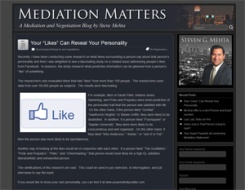 Moving forward the new Mediation Matters blog articles will be posted to my own website. You will be able to find all of the archived blogs and new blog articles at the following URL:
Moving forward the new Mediation Matters blog articles will be posted to my own website. You will be able to find all of the archived blogs and new blog articles at the following URL:
http://www.stevemehta.com/blog
Thank you!

A Mediation and Negotiation Blog By Steve Mehta
 Moving forward the new Mediation Matters blog articles will be posted to my own website. You will be able to find all of the archived blogs and new blog articles at the following URL:
Moving forward the new Mediation Matters blog articles will be posted to my own website. You will be able to find all of the archived blogs and new blog articles at the following URL:
http://www.stevemehta.com/blog
Thank you!
Recently, I have been conducting some research on what items surrounding a person say about that person’s personality and then I was delighted to see a fascinating study on a related issue addressing people’s likes from Facebook. In essence, the study research what predictive information can be gleened from a person’s “like” of something.
The researchers only evaluated items that had “likes” from more than 100 people. The researchers used data from over 58,000 people as subjects. The results were fascinating.
 For example, likes of Sarah Palin, Indiana Jones, Swimming, and Pride and Prejudice were most predictive of the personality trait that the person was satisfied with life. On the other hand, if the person liked “Gorillaz” “Hawthorne Heights” or Stewie Griffin, they were likely to be disatisfied. In addition, if a person liked “Foursquare” or “Kaplan University”, they were more likely to be conscientious and well organized. On the other hand, if they liked “Wes Anderson,” “Anime,” or “Join if Ur Fat,” then the person was more likely to be spontaneous.
For example, likes of Sarah Palin, Indiana Jones, Swimming, and Pride and Prejudice were most predictive of the personality trait that the person was satisfied with life. On the other hand, if the person liked “Gorillaz” “Hawthorne Heights” or Stewie Griffin, they were likely to be disatisfied. In addition, if a person liked “Foursquare” or “Kaplan University”, they were more likely to be conscientious and well organized. On the other hand, if they liked “Wes Anderson,” “Anime,” or “Join if Ur Fat,” then the person was more likely to be spontaneous.
Another way of looking at the likes would be in conjuction with each other. If a person liked “The Godfather,” “Pride and Prejudice,” “Plato,” and “Cheerleading,” that person would most likely be a high IQ, satisfied, liberal/artistic and extraverted person.
The ramifications of this research are vast. This could be used in jury selection, in interrogation, and job interviews to say the least.
If you would like to know your own personality, you can test it at http://www.youarewhatyoulike.com
By Steven G. Mehta
“NEXT TIME YOU find yourself in a negotiation, don’t just throw out a round number. In a series of experiments, researchers from Columbia University found that offering a precise number—e.g., $4,925 compared to $5,000—resulted in a significantly more deferential counteroffer, due to the perception that a precise opening offer was more reasoned and informed.”
Mason, M. et al., “Precise Offers Are Potent Anchors: Conciliatory Counteroffers and Attributions of Knowledge in Negotiations,” Journal of Experimental Social Psychology (forthcoming).
source: http://bostonglobe.com/ideas/2013/03/16/jihad-career-strategy/wAjvqSVRWDysHbGMmmX40N/story.html
The question that i would ask, is what is the best time to do such an offer. I would suggest that making a final offer or close to final offer with such precision is much more effective in the litigation context than the early offers. However, in much of the real world negotiations outside of litigation, having such an offer from the outset might give more credibility to the other side really thinking about why you made the offer so specific.